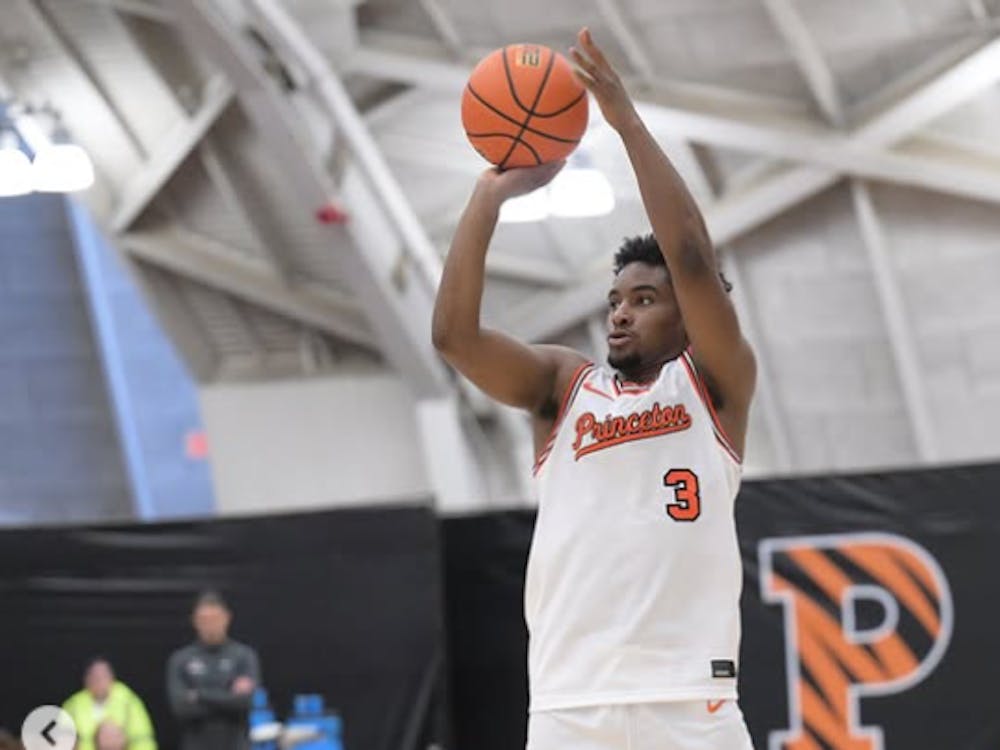Reigning Ivy League Outdoor Pole Vault Champion Adam Bragg recently eclipsed an astonishing 5.65 meters. The feat snaps a previous 23-year all-time Ivy League record and, more importantly, qualifies Bragg for the Olympic Trials. The Daily Princetonian sat down with Bragg to discuss his Princeton experience, graduation and professional life.
Daily Princetonian: What is the context and significance of your latest record-breaking jump?
Adam Bragg: The United States Olympic Committee sets a mark that determines entry into the Olympic Trials. On that day of February 12 at the Fastrack National Invitational, I jumped 5.65 [meters], which is the qualification mark. I was able to solidify my competition in the Olympic Trials.
DP: How do you even practice for such high stakes competitions?
AB: I usually like to train at the heights you’re going to be competing at and it’s especially helpful that I’ve eclipsed such heights in practice. During practice it’s better to get the repetition.
DP: How did you get into pole vaulting and decide to pursue it professionally?
AB: I have a background in trampoline and I competed in that starting around the age of three to four years old, but by the time I was in the eighth grade I knew I wanted to compete collegiately in pole vault. So I started training with Victor Athletics in Southern California. I think as I’ve progressed in college it’s become more and more of a reality.

DP: Can you describe the transition from being a collegiate to professional athlete?
AB: I anticipate the transition is going to be dealing with a lot more available time. In college you have to worry about classes and thesis, especially senior year. I’m looking forward to being able to relax and settle into a more fluid training schedule.
DP: How much do you feel like you are a student versus an athlete?
AB: Well, this spring it’s really ramping up on me on both sides because I have the deadline of the thesis coming up. I’d like to finish that up so I’m not stressing out about it so I can focus on the bigger competitions. I am also taking some classes I really enjoy this semester.

DP: What were the highest and lowest points of your Princeton career?
AB: The lowest points have to do with being so far away from home, not having any family on the East Coast. The highs are developing relationships with my teammates. It forced me to attach myself and get closer. Developing those relationship and having a group of lifelong friends are the things I’m most proud about.
DP: How do you think you’ve changed since your freshman year?
AB: Princeton has allowed me to explore a lot of sides of myself and really solidify the type of person I want to become. My freshman year I was a little more adventurous, but now, as my Princeton career has moved forward, I’ve narrowed it to a list of things I’m really passionate about.
DP: Are there specific qualities Princeton developed in you?
AB: Princeton has so many opportunities that it encourages an inquisitive mind. For example I came in as an engineer but now I’m a history major — it’s something I really enjoy. [History] wasn’t a subject I necessarily excelled in in high school, but as I took more classes here it really piqued my interest. Now, I can explore history and pursue it more deeply.
DP: How do you plan on balancing pole vaulting with history after graduation?
AB: I think part of the professional athlete lifestyle is that you have a lot of free time. I am excited about pursuing some of these other interests that the thesis got in the way of. The free time is giving me opportunity.
DP: What’s on your bucket list for the final three months of Princeton?
AB: I am geared into my goals now. The major things are finishing the thesis, doing well in classes and doing well in the outdoor season. I also want to enjoy the final few months surrounded with all of my friends.
DP: What have been your friend’s reactions to your success?
AB: The friends that are the closest with me — the ones I call brothers — definitely had the understanding it was just a matter of time. The other attention is exciting as well; it’s good to see the hard work I’ve put in finally paying off.
DP: What are you most looking forward to and fearful of after graduation?
I probably share the fear of a lot of great athletes: not being able to reach the full potential I see myself reaching. But even more, I am excited about pushing myself to those limits. I’ve set my goals really high so if I can even come close I’ll have accomplished a lot.
DP: What advice would you give to younger, aspiring pole vaulters across the nation?
AB: For pole vaulters, the sport is a test of your own belief in yourself. It’s a fear-based event. In order to battle the fear you have to fill yourself with confidence. Not letting failures get in the way of your self-image is really important for pole vaulters. That lesson can be learned by people in general. Princeton has taught [me] that you will experience setbacks and when a challenge confronts you, the best way to react is with confidence and positivity.
DP: Any final words as you continue to build on your success?
AB: It would be nice to thank the people who have been supporting me: my family and friends, the coaching staff here, my club coach back home, BJ Vandrovec. All those people had such a positive impact on me and helped me to stay positive in the face of all those negative setbacks, which I did experience. But I’ve come through and grown a lot in the years and am now excited to continue into my professional career.







